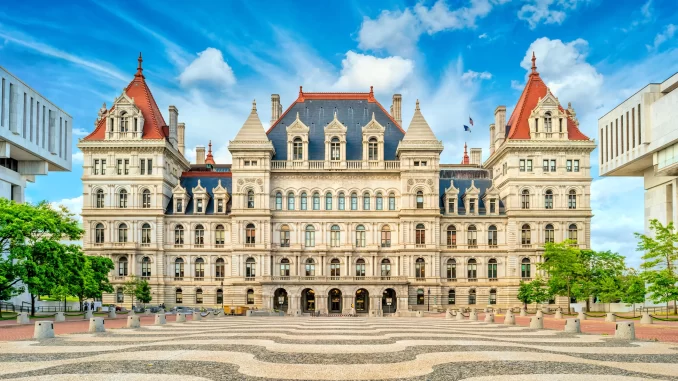
By the Center for Cost Effective Government
It’s 2025, which means New Yorkers will be subjected to a slate of new laws as well as a bunch of laws that were vetoed by the governor. Some of these laws and vetoes may be OK with some New Yorkers, and there are others that won’t sit well with them. Here is the list.
NEW LAWS:
- Higher minimum wage — As of this month, the minimum wage for New York City and Long Island is $16.50 an hour.
- Seatbelt requirement — now required for all charter buses.
- No more return fees for car leases — Auto dealers will no longer be able to hit you with a charge for turning in your car at the end of the lease.
- Paid pre-natal leave — By now, most of us know that New York and other states require a minimum amount of paid leave after a woman delivers a child. New York is now the first state in the nation to require paid leave for prenatal doctor appointments.
- Telemarketer law — Telemarketers will now have to disclose to the person being called the name, address and phone number of the telemarketer upfront in the call.
- Lost cell phones locked — If you lose your cell phone, you will now be able to require the provider to lock down the phone.
- Shut down hot schools — If the temperature in a school exceeds 82 degrees, the school must take measures to cool it down. If it exceeds 88 degrees, it must close.
- EpiPens — The consumer’s out-of-pocket cost for EpiPens will be capped at $100 per package.
FOUR NEW TERRIBLE LAWS:
- Congestion Pricing — Starting this month, motorists will pay at least $9 for the privilege of driving into Manhattan. If anyone believes this will reduce climate change we have a bridge in Brooklyn to sell you.
- Expanded Workers Comp coverage for stress — Social Security Disability and Workers Comp payments exploded over the last two decades, in large part because workers are now being compensated for stress. This new law in New York State expands coverage to even more stress-related incidents. These nebulous, hard-to-disprove claims are costing employers and taxpayers a fortune. It will only exacerbate the difficulty businesses have in existing in this state.
- A $75 billion charge to energy producers — The governor signed a bill that will cause electric rates to soar, but instead claims that it will be an advantage for consumers. The law hits various oil and gas utilities and producers with an enormous $75 billion fine for climate change matters, even though there’s no nexus between climate change and these individual companies. This, of course, will most certainly be passed along to New York consumers, who already saw a 13% increase in costs this past year. The bill is likely going to be tied up in court, since it is probably unconstitutional.
- Drop boxes allowed — Instead of tightening controls on the electoral process to halt the erosion of confidence voters have in the system, the state has legalized dropboxes, which end the chain of custody from the voter to the Board of Elections.
BAD VETOES:
- Transparency — The governor once again vetoed a measure that would have ended emergency measures that allow the governor to bypass oversight from the Comptroller.
- Downstate casino deadline — The present law requires findings regarding downstate casino studies to be completed by the end of the year in 2025. The proposed law would have pushed it up to August 31. The governor vetoed it, though there doesn’t seem to be any reason for delaying the matter further.
GOOD VETOES:
- Wrongful death damages — The governor vetoed a bill that would have expanded wrongful death recoveries to include emotional damages It would have further added to our enormous insurance bills in the state
- Pension sweeteners — Some law enforcement agencies sought parity with others who are receiving huge benefits. Passage would have added even more burdens on local governments and taxpayers.
- IDA membership — The governor wisely vetoed a measure that would have mandated union and school board representation on Industrial Agency boards. While it might be useful to have such input, mandating local governments to place on the boards people from specific segments in society is an overreach and such appointments should be left to the discretion of the local governments.
The Center for Cost Effective Government is a think tank dedicated to exposing wasteful government spending and educating the public on various measures that can control taxing and spending for the purpose of creating more hospitable conditions for taxpayers and the business community. www.centerforcosteffectivegovernment.org

